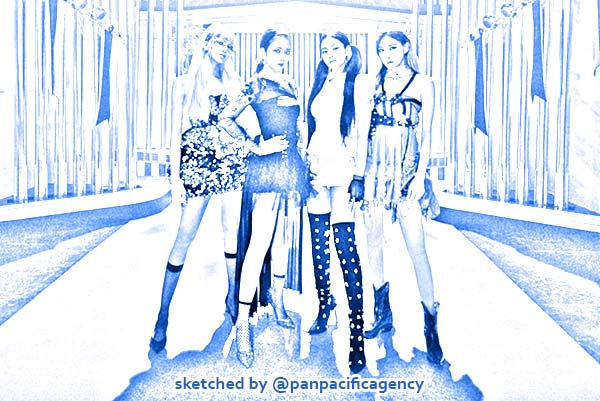Indonesian K-pop fans fume over tariff on e-commerce imports

Blackpink is the most popular K-pop group on Spotify with more than 9.7 million monthly listeners worldwide. (twitter.com/ygent_official/File). Sketched by the Pan Pacific Agency.
JAKARTA, Dec 28, 2019, The Jakarta Post. Local K-pop fans have expressed their disappointment on social media after the government slapped import tariffs on more e-commerce goods. Finance Ministry Customs and Excise Director General Heru Pambudi announced on Monday that the ministry would impose import tariffs on e-commerce goods priced at US$3 and above to control imports and protect local industries, The Jakarta Post reported.
According to customs office data, some 50 million packages of overseas products sold via e-commerce entered the country in 2019. This number marks a drastic increase from 19.6 million packages in 2018 and 6.1 million in 2017. Most of the goods come from China.
The new policy drew a negative response from avid K-pop fans, who regularly purchase merchandise and albums from sellers abroad.
“One K-pop album costs [about] $14. Next time I buy an album, I might be paying Rp 400,000 ($28.86) for it,” said a Twitter user with the handle @buryoneself.
Another user, @sweetfriday, complained that the new policy would affect K-pop fans negatively, as there were no official stores in the country selling K-pop related goods.
“Importing K-pop goods won’t harm local industry, since we cannot find official [K-pop] album producers. Not every imported good will harm local sellers. Are you saying that I have to pay a tax for buying one album?” the user tweeted under the reply to the Customs and Excise Office’s Twitter account, @beacukaiRI.
Under the new tax policy, to be implemented by the end of January, the import tariff will be reduced from between 27.5 and 37.5 percent of a product’s value to 17.5 percent. However, previously the tariff only applied to goods priced at more than $75.
Meanwhile, imported textiles, clothing, bags and shoes that cost $3 and above will be subject to tariffs of 32.5 to 50 percent of their value.
“This is to protect local industries that have been producing goods that are often traded on e-commerce platforms, such as sandals, crafts and handbags,” Heru said as quoted by kompas.com.